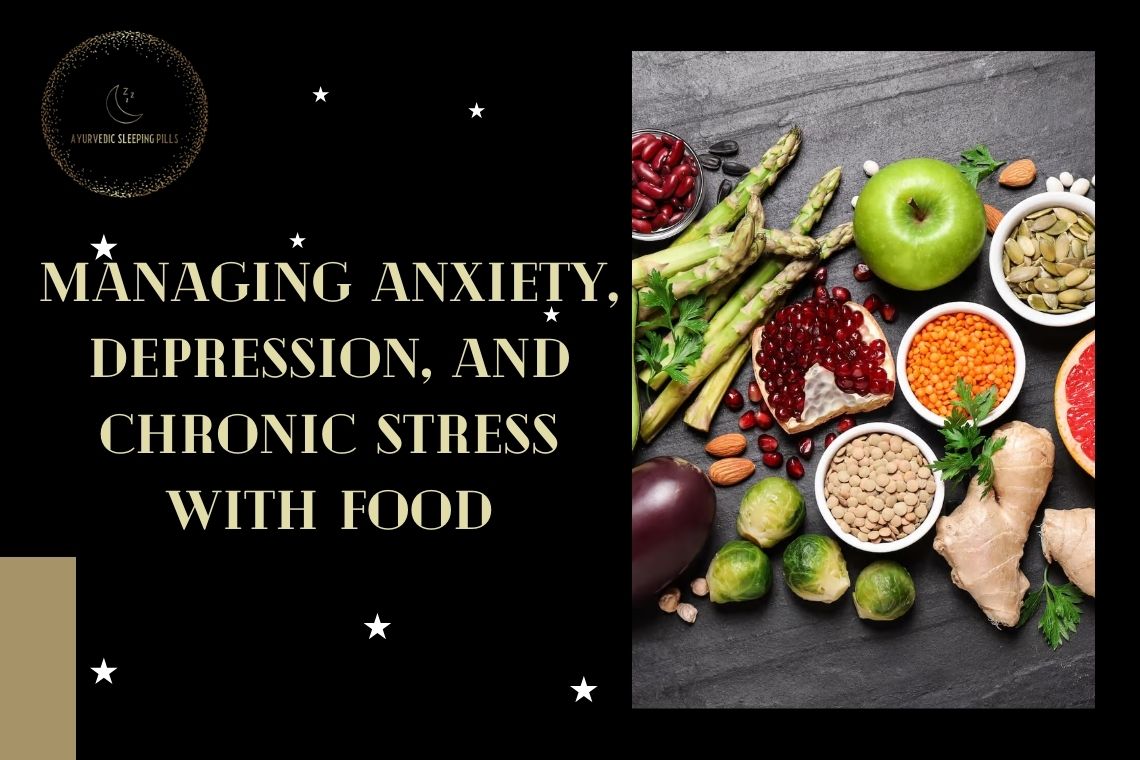
Managing Anxiety, Depression, and Chronic Stress with Food
They say we are what we eat, and a lot of studies reveal how the mind and gut are linked and can influence each other. What foods can soothe our nerves or treat depression, chronic stress, and anxiety? Is nutrition important for mental health?
The Ayurvedic Lifeview
Ayurveda states that all manifest living forms are made of air, ether, fire, earth, and water, which give us a unique physical and mental constitution based on three bio-energies. Doshas are vata (air), pitta (fire), and kapha (earth). To live fit, happy, and disease-free, they should be balanced. However, environmental, lifestyle, food, and hereditary factors almost guarantee an imbalanced dosha. Long-term dosha impairment can cause sickness. Ayurveda uses panchakarma, nutrition, medicines, yoga, and lifestyle changes to balance the three doshas.
Depression and Doshas
Two or more dosha imbalances can cause ‘Unmada,’ mental diseases in Ayurvedic writings. These ancient books mention many modern clinical indications of depression and diseases. Lack of clarity, fickle mind, unstable vision, incoherence in speech, heart emptiness, emotional numbness, inability to behave oneself, memory loss, and a fluctuating mind are signs of Unmada. Ayurveda classifies depression and its symptoms by the three dosha kinds, and remedies vary by dosha imbalance.
Vata Depression
Vata depression can be caused by the loss of a loved one or a job. Vata dosha depression causes weakness, heart emptiness, and appetite loss.
Kapha Depression
Attachment to the lost person or thing, sluggishness, low food, self-isolation, and excessive sleep suggest this type.
Pitta Depression
Irritability, misery, and loss of will are signs of pitta depression, which often follows life failure or burnout.
Gut-Depression Connection
A recent study suggests that a leaky gut, gut microbiota, and gut-brain axis dysfunction contribute to depressive symptoms. Balance gut microbiota, balance mind—experts say gut bacteria can connect with the brain.
Stress and depression can disrupt GI tract contraction and motility, causing inflammation and infections. Stress may also impair GI patients since they are more susceptible to gut-to-brain pain signals.
Depressive symptoms might result from gastrointestinal inflammation. A leaky gut causes toxins from intestinal bacteria to enter the bloodstream, worsening these symptoms. A 2017 study found that nutritional counseling and a balanced diet improved mild-to-severe depression symptoms over 12 weeks.
Stress-Relieving Foods
Vata and pitta doshas control mental and bodily functions, therefore balancing and calming them reduces anxiety, sadness, and chronic stress. The doshas also affect autonomic balance. A prolonged parasympathetic nervous system activity is considered best for autonomic homeostasis. Overactivity of the sympathetic nervous system causes stress.
What to Eat
Eat fresh, processed-free, sugar-free, stimulant-free meals. Healthy, nourishing, and grounded diet. Dietary changes can help balance doshas.
Eat blueberries, raspberries, strawberries, amla, oranges, and bananas. They lower pitta and are antioxidant-rich. Berries lower the stress hormone cortisol.
High in potassium, coconut water relaxes and nourishes the body and reduces muscle stress.
Milk is rich in nutrients and soothes the nervous system, boosting the mind-body complex.
The nuts alleviate mental tension. Good fats like linoleic acid, magnesium, and antioxidants in nuts assist the body and mind fight stress by lowering cortisol. Morning-soaked almonds are a nut option. Eat raw almonds before meals to improve nutritional absorption.
Dark chocolate releases feel-good hormones that alleviate stress. Naturally sweet foods diminish pitta and vata.
Use ginger, cardamom, basil, Brahmi, Ashwagandha, chamomile, and mint to relax.
Ghee or clarified butter in diet boosts ojas, the body’s and mind’s ultimate energy source. (Low ojas causes depression.)
Vitamins
Vitamins are needed to synthesize serotonin, for mood and happiness. Vitamin D reduces depression symptoms, research shows. Sunlight and fortified dairy products provide vitamin D.
Selenium boosts mood and reduces anxiety. Whole grains and Brazilian nuts contain selenium.
Omega 3 fatty acids’ anti-inflammatory qualities and capacity to directly reach mood-related brain chemicals may help treat depression. These are in fish, fish oil, flaxseeds, chia seeds, and walnuts.
Vitamins A, C, and E help the body resist oxidative stress, an imbalance between free radicals and antioxidants that protect cells. Antioxidants may alleviate anxiety and depression caused by free radical buildup. Berries, soy, fresh fruits, avocado, leeks, onions, garlic, eggplant, grapes, pumpkins, mangoes, apricots, carrots, spinach, parsley, milk, and almonds contain antioxidants.
Protecting the nerve system and brain requires B vitamins, especially B12 and B9. They lower mood disorder risk. Salmon, leafy greens, eggs, milk, legumes, yogurt, and sunflower seeds contain these.
Foods to Avoid
Refined sugar and excessive sugar can lower BDNF, which causes depression and anxiety.
Apart from worsening depression, alcohol can cause dependency and withdrawal.
Foods processed are heavy in sugar, and carbs, and poor in vitamins and minerals.
Red meat, trans fats, corn oil
Depression sufferers should minimize coffee after midday.
Finally, eat mindfully—aware and unaffected. Give your body attentive relaxation after eating and practice yoga, meditation, and pranayama (deep breathing) daily.










Leave a reply